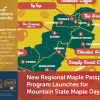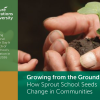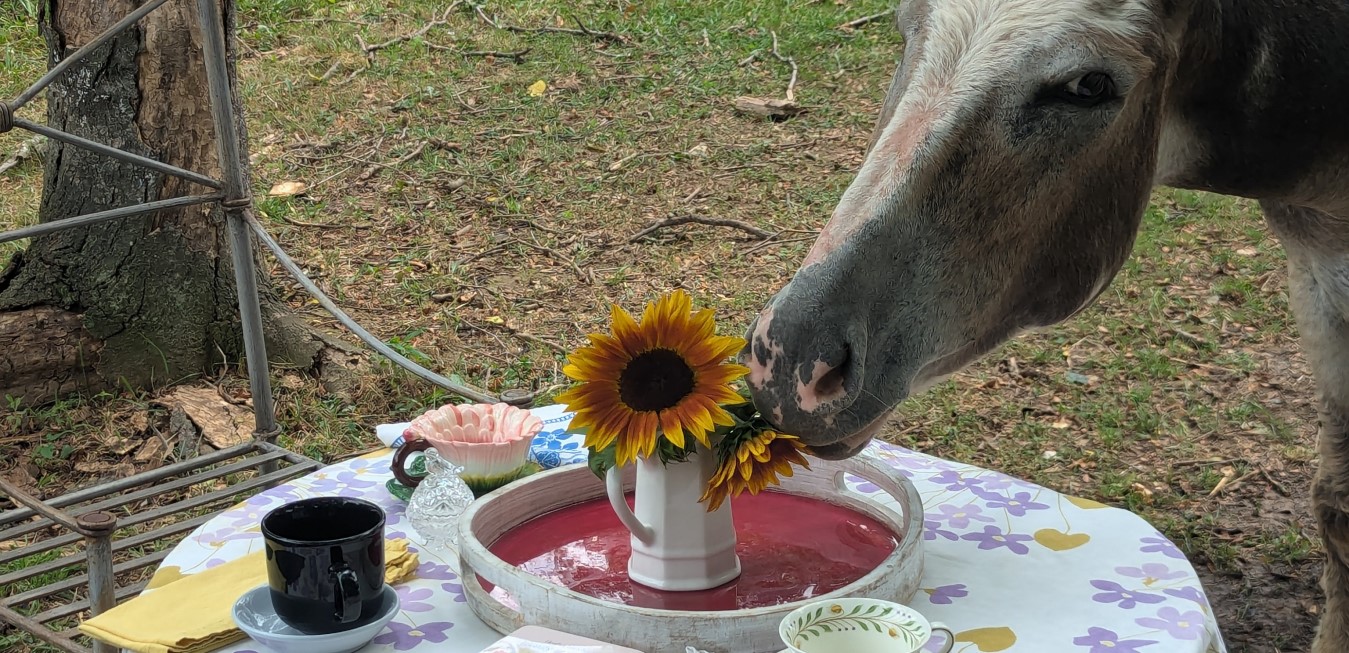
Creative Ideas Bloom
Through Sprout School Projects
What do sniffing dirt, sipping tea with donkeys, dyeing fabrics using plants, and moving through cow-inspired stretches have in common? Sprout School! Specifically: each are components from different Sprout School projects completed during the program’s inaugural year.
Over the last nine months, participants in Future Generations University’s Sprout School program have designed and implemented a wide variety of projects centered around engaging youth in their communities with agriculture, gardening, nutrition, and more.
Margaret Donnan, youth education associate, said, “We are so impressed by the creativity, enthusiasm, and dedication the participants have poured into their projects, and we feel honored to have the opportunity to highlight five of these projects here!”
Project #1: Family Farm Day and Donkey Tea Parties
Annie Young & Rob YoungRainbow Montessori School & Young Harvests Farm
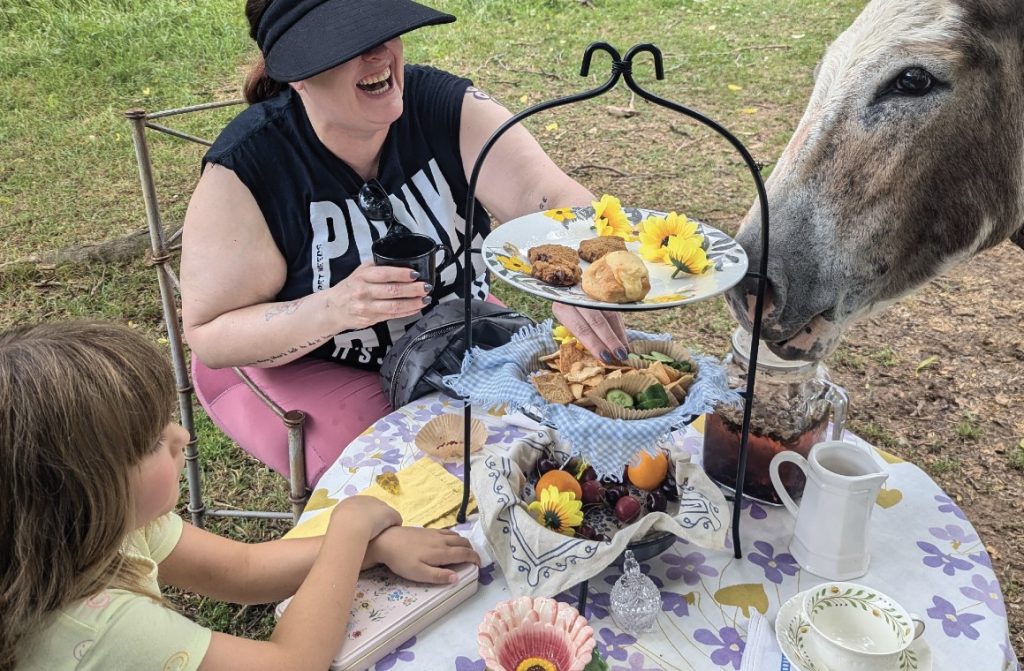
Annie and Rob Young connected families from Rainbow Montessori School and families from their community to Young Harvests Farm through Family Farm Day. The action-packed day featured activities including a StoryWalk provided by the Potomac Valley Audubon Society, greenhouse tours, vegetable harvests, pizza making, journaling, and a scavenger hunt.
Reflecting on the event, Annie and Rob said, “Having the opportunity to bring families out into nature and to our farm was so empowering for our own vision and values. Witnessing the families connect with nature and how food grows was so fabulous and then unexpectedly the families really opened up to each other and created a community within the course of the afternoon.”
Continuing the theme of connecting families to nature and agriculture, Annie and Rob also hosted several Donkey Tea Parties. While sipping tea and munching on locally sourced baked goods, tea party guests were treated to the company of donkeys and learned more about silvopasture, the deliberate integration of trees and grazing livestock operations on the same land. The donkeys got tea party treats, too; they had their own fancy plates with cut carrots, watermelon, and herbs from the farm that families fed them.
Project #2: Planting a Mini Food Forest at the
Kids Learning Garden in Romney, WV
Tona TriceHops Meadow Farm
Tona Trice’s Sprout School project enabled her to start a mini food forest at the recently established Kids Learning Garden in Romney, WV.
When asked to describe the project and what she’s enjoyed about the Sprout School program, Tona wrote, “Sprout School is a different experience for everyone and that’s what makes it great.”
For us, Sprout School was about developing a strategic approach to growing the next generation of producers – not just teaching ‘where food comes from,’ but also exploring the decades of breeding that lead to current crop varieties, and the potential to generate intellectual property and cash flow from the strategic choices we make.
Our project allowed us to launch an urban-style food forest in an economically disadvantaged area. In the short-term, kids can snack on free apples and pears. In the long-term, they can experiment with new varieties and grow their entrepreneurial spirit.”
Project #3: Blossoms & Bites –
Exploring Plant Dyeing and Edible Flowers
Shelly Keeney & Lydia Cyrus
Refresh Appalachia
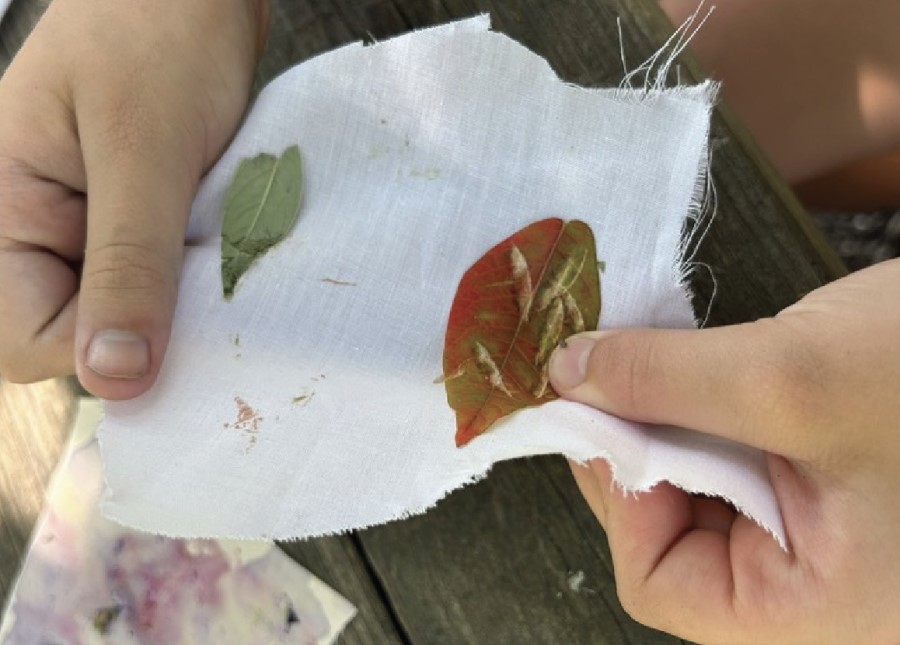
Throughout the summer, Shelly Keeney and Lydia Cyrus led workshops introducing kids to plant dyeing, edible flowers, and healthy eating habits through hands-on activities and exploration. In these classes, students created designs and changed the colors of fabrics using pigments found in plants and flowers.
Here are Shelly’s thoughts on participating in Sprout School:
“Working with Future Generations University’s Sprout School has been an incredibly fulfilling experience. The school’s commitment to helping us provide hands-on, nature-based learning opportunities, such as our Edible Flower & Natural Dye projects, has helped us make a significant impact on our ability to help young learners embrace new ideas and skills.
Children need a deeper connection to the environment and their community to help them understand the world around them.
I highly recommend this program for its ability to engage and inspire children in such meaningful ways.”
Project #4: Good In, Good Out Curriculum
Emily ChurchSnowville Creamery
Emily Church developed the Good In, Good Out Curriculum, a series of lessons focused on connecting socio-emotional learning and agriculture. Over the course of five lessons, students begin to accurately recognize their own emotions and thoughts; understand their strengths and weaknesses with a sense of integrity, confidence, and optimism; and identify ways to respectfully advocate for personal needs. Students reach these goals by completing activities rooted in agriculture, such as reading the book The Calf on My Farm to discuss the topic of personal needs and completing cow-inspired stretches to discuss the topic of emotional regulation.
When asked if she would recommend the Sprout School program, Emily said, “Without a doubt, get yourself to Sprout School! This opportunity pushed me to nail down the project budget and lay out the basic curriculum outline. Without this opportunity, I would not be as far as I am currently.”
Project #5: Children’s Sensory Garden in the
9/11 Memorial Universal Garden
Elizabeth Campbell
Morgan County Community Educational Outreach Service (C.E.O.S.)
Garden Club
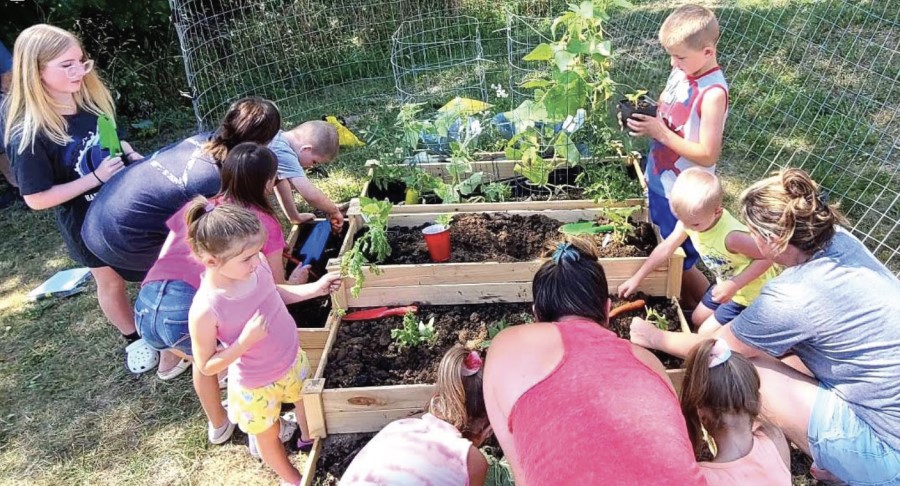
When Liz Campbell began the first Children’s Sensory Garden workday, she did not plan on asking the kids working in the garden to smell dirt. But, as a storm was rolling in, Liz wanted to make sure there was enough time to get the work in the garden done and complete a lesson on the five senses. Liz pivoted from her initial plan of passing around herbs for the smell portion of the lesson, instead opting for the more easily accessible potting soil they’d been using throughout the workday. When she asked the young gardeners what the potting soil smelled like, they exclaimed in disgust, “It smells like dirt!” On a second Sensory Garden workday, the gardeners got the opportunity to smell sage instead, which was a scent they found more appealing than the potting soil.
The Children’s Sensory Garden, which the Morgan County CEOS Garden Club installed with students for their Sprout School project, is part of the ADA accessible 9/11 Memorial Universal Garden in Berkeley Springs, WV. The Morgan County CEOS Garden Club designed the children’s garden to activate the five senses, serve as a space for lessons about horticulture, and promote therapeutic practices by creating a warm, relaxing, and inviting atmosphere for people of all ages and abilities.
“I always knew I wanted to do a project to address food insecurity in my county,” Liz said when asked to describe her Sprout School project. “Sprout School helped me to learn and utilize farm to table and farm to school strategies to successfully realize that dream.
Thanks to Sprout School, our county was able to build a Sensory Garden that would both teach children about the connections between horticulture and health and encourage and empower them to grow food at home.
Thank you, Sprout School, for all your wonderful lessons!”
Congratulations to each of the inaugural 2023 Sprout School participants for the amazing work they’ve contributed to the program. If you are interested in participating in Sprout School, the next cohort begins October 1st, and we would love to have you join us! Sign-ups are open through September 15, 2024, at https://bit.ly/sprout2024.
For more information, please email sprout@future.edu.
